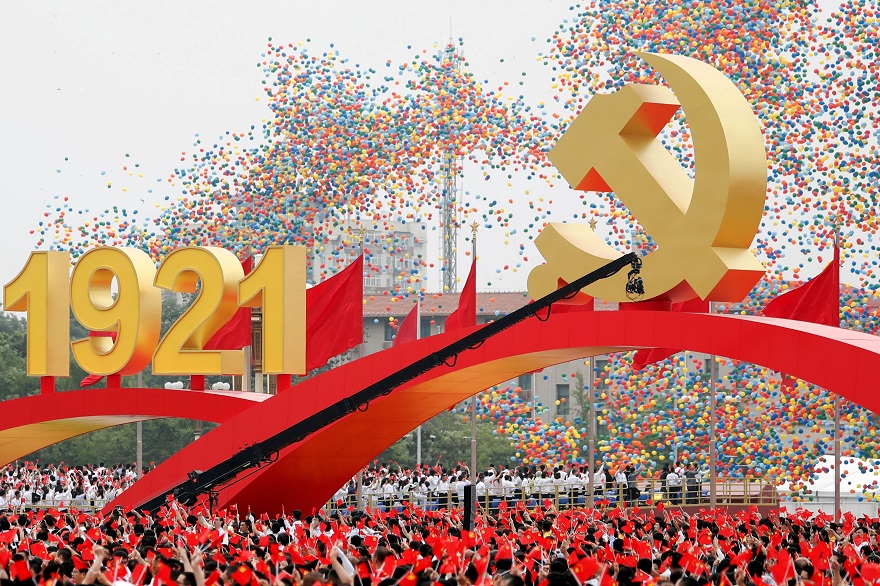Sun Lijun has been accused of forming gangs inside the Party, abandoning his post from the frontline of the fight against Covid-19 and secretly possessing a large amount of classified material pertaining to the pandemic.
Ever since his ascendance to power, President Xi Jinping has eliminated political enemies across military, judiciary, law enforcement agencies and finance sector. Some of the bigwigs who have been investigated and penalized include Bo Xilai, Zhou Yongkang, Ling Jihua, Xu Caihou, Guo Boxiong and Sun Zhengcai. Investigations are conducted by the Central Commission for Discipline Inspection (CCDI), China’s top anti-graft body under sweeping anti-corruption campaigns like “Killing tigers and swatting flies” (打虎拍蝇), and “Sweep away black and eliminate evil” (扫黑除恶). The hammer has also fallen on those who ironically were associated with probing some of these cases. The recent penalisation of Sun Lijun, Vice Minister of the Ministry of Public Security, and Fu Zhenghua, former Minister of Justice is a pointer.
On 30 September 2021, in a 700-character denunciation published on the CCDI official website said that “Sun Lijun, former member of the Party Committee and Vice Minister of the Ministry of Public Security, has been expelled from the Party and public office for serious violations of discipline and law.” Two days later, on 2 October 2021, the same website posted that “Fu Zhenghua, Deputy Director of the Social and Legal Committee of the CPPCC National Committee, is suspected of serious violations of discipline and law, and is currently undergoing disciplinary review and investigation by the CCDI.” Both Sun and Fu have been associated with the notorious “610 Office” established during Jiang Zemin’s reign for persecuting Falun Gong practitioners and followers. Fu tried to win over Xi by distancing himself from the “Jiang Faction” and bringing down titans like Zhou Yongkang and Hu Jintao’s aide Ling Jihua. Both were given life sentences in 2014 and 2016, respectively. Sun, who was instrumental in preparing the ground for the new security law for Hong Kong since 2017, also failed to win the trust of their leader.
Most of the content of the 700-character denunciation of Sun, is pretty routine vocabulary used for almost all the convicts. However, what stands out are two things. First, Sun has been accused of wantonly forming gangs inside the Party (在党内大搞团团伙伙), and the second is abandoning his post from the frontline of the fight against the Covid-19 pandemic (在抗击新冠肺炎疫情一线擅离职守) and secretly possessing a large amount of classified material (私藏私放大量涉密材料) pertaining to the pandemic.
As regard the first, it is linked to the cases of people like Meng Hongwei, the former Interpol president who also served as Vice Minister of the Ministry of Public Security, Wang Like, former member of the Standing Committee of the Jiangsu Provincial Party Committee, his subordinate Luo Wenjin, former police chief, Criminal Investigation Department of Jiangsu Public Security Department, and now Fu Zhenghua. It may be remembered that when Sun Lijun was investigated last year on 19 April, Fu Zhenghua was quickly removed from the post of Minister of Justice. This together with Fu “accepting” investigations on 2 October 2021, two days after Sun’s verdict, cannot be a mere coincidence. These are believed to be closely linked to Zhou Yongkang, even Wang Lijun, the Chongqing police officer, who sought refuge in the US consulate in Chengdu during the Bo Xilai affair, is believed to have close connections with the above people. The second accusation demonstrates that rather than combating Covid-19 in Wuhan in early 2020, Sun left for some other place while in possession of a large amount of classified material pertaining to the pandemic. It is believed that since the wife and son of Sun live in Australia, he could have shared sensitive information about the pandemic and Wuhan Institute of Virology with his wife, which is likely to have been intercepted by Australian intelligence. This could also be the reason as to why Australia became the first nation, and rather vociferously, to demand investigations into the origin of the Covid-19, risking the deterioration of its bilateral relations with China.
It appears that the factional feud is getting intensified before convening of the 20th Party Congress next year. Chinese official media, Xinhua News Agency has admitted to the existence of factions within the Party. On 3 January 2015, in a report it referred to factions such as “secretaries gang” (秘书帮), “petroleum gang” (石油帮) and “Shanxi gang” (山西帮), attributed to once powerful petroleum and security czar, Zhou Yongkang and Ling Jihua, former director of the Central Committee General Office. Another commentary on CPC website on 5 January 2015 had stated that “Beneath the old tigers, there are big tigers, and behind the big tigers there are foxes and rats. Where gangs form, there are also gang lords; where there are cliques, there are also ‘mountain tops,’ and these kinds of ‘mountain tops’ are very harmful to our Party.” Now, who are these “big” and “old” tigers behind the fallen “tigers” of the political and legal system of China? The finger is pointed towards Meng Jianzhu, a former member of the Political Bureau of the Communist Party of China and secretary of the Central Political and Legal Affairs Commission. Behind Meng Jianzhu, it is believed is the hand of Jiang Zemin and Zeng Qinghong. It appears that after having cleansed the army, bigtech, finance sector of his detractors, Xi Jinping is gradually cleaning the sensitive political and legal system, which is supposedly infested with the “remaining toxin” of the “petroleum” and “Jiangxi gang.”
B.R. Deepak is Professor, Center of Chinese and Southeast Asian Studies, Jawaharlal Nehru University.

